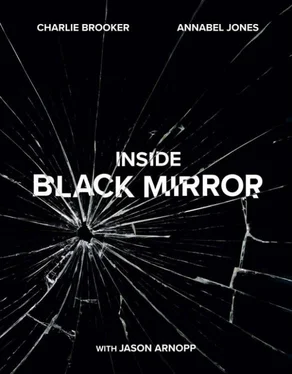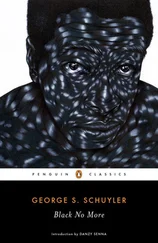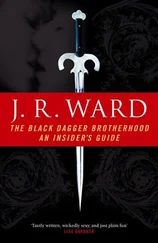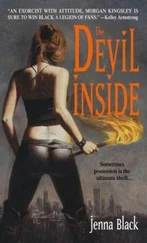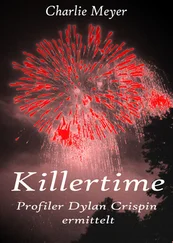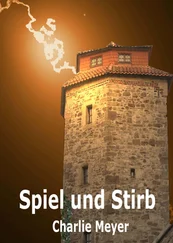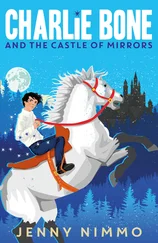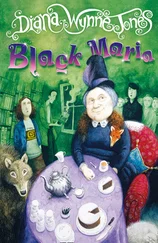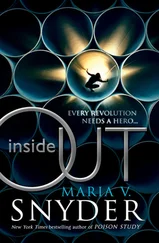Shane Allen:Charlie and Annabel were incredibly animated about telling one-off tales about a world that could be just around the corner. They had an entirety of vision about what a modern Twilight Zone -esque anthology series could tackle. They would identify a social media trend or piece of technology and do a “What if?” extreme cautionary tale with it. At the time, anthologies were seen as prohibitively expensive and each week you’d be resetting the audience connection button. It was also seen as a commercial dead end, as you’d never be able to sell it abroad, because one-offs didn’t travel.
This time, my homework was a box set of the original Twilight Zone.
Charlie Brooker:The pitch became more finessed. One pitch document literally said, “Just as The Twilight Zone would talk about McCarthyism, we’re going to talk about Apple.” It got more and more targeted, at a time when the really happy shiny adverts for Apple were appearing. Everyone was walking around going, “This shit’s great, look at my iPhone, it’s brilliant.” Twitter and all this stuff was in its early days.
Being a paranoid person, as soon as I see any advert where everyone’s happy and smiley I immediately think it’s a bit like a sinister advert in a dystopian movie. It should pan down to me watching it in a pod, while crying and eating Soylent Green [the dubious wafer from the 1973 sci-fi film of the same name]. The fact that it looked so happy meant it couldn’t last, so I was immediately unsettled by that.
Shane Allen:There’s a culturally different approach in drama, compared to comedy, which is probably why Charlie and Annabel stuck with me with what is essentially a drama-shaped piece. In comedy, the writer is king or queen and is usually the creative centre of gravity. In drama, that focus shifts more towards the director. Charlie and Annabel have always been showrunners in the US sense rather than the UK series-producer sense, in that they are the key creative influence on the show. I was able to help them retain the creative whip hand on the series, because we had a good understanding of how they worked by this point.
Charlie Brooker:The original idea was that Black Mirror was going to be eight half hours, all by different writers including me. Technology wasn’t the sole focus. It was mentioned in the early pitch documents, but so were terrorism and generally contemporary things. In the same way that you wouldn’t say The Twilight Zone was about UFOs, technology was definitely mentioned but it wasn’t a focus to quite the same degree.
Annabel Jones:There’s a huge discipline to the short film form. We’re slightly more trained now, but at the beginning we spent a long time questioning every single element of the world and addressing every detail in the script, in an attempt to make the film feel comprehensive, cohesive and authentic. But we couldn’t do it all justice in a short film, so we had to streamline the stories. We found ourselves telling more fruitful and satisfying stories by keeping the worlds slightly smaller.
Charlie Brooker:When you focus on the smaller story, it often actually becomes more relatable.
Annabel Jones:I think one of the successes of the show is that people like it because it feels very relevant, or it resonates with them. There is a human element, and by virtue of being a smaller show, we have always held onto that.
Charlie Brooker:A lot of shows you watch are not relevant to your life, basically. Except maybe if you see the TV detective at home and he bangs his knee on the table, and you go, “When I bang my knee that really hurts too!” That’s not a good example! Well, you know…
Annabel Jones:I can’t remember whether Charlie wrote the first Black Mirror script and then we thought, “Actually, this should be more like 60 minutes” or whether we, from a prosaic, budgetary point of view realised we could get more bankroll with 60 minutes.
Charlie Brooker:I can’t remember either, but I think it was a bit of both. That’s why the first script, Fifteen Million Merits , came out at about 45 minutes. So I think we delivered the first script, which Shane liked. And then Jay Hunt, Channel 4’s Chief Creative Officer, asked for a second script to get a sense of what the series could be.
Barney Reisz (producer):Annabel and Charlie came to me with the script for Fifteen Million Merits and a commission for three hour-long episodes. They had no idea what the other two episodes would be, but they wanted to get on with it. We met in Cafe Boheme in Soho, had a chat and we all got on, so I signed on to produce. I liked that Charlie was writing really wonderful character detail, but with a background of futuristic stuff. He puts human situations first and technology second.
Charlie and Annabel are incredibly un-starry. They’re not demanding in the way that incredibly talented people can be, which is very refreshing. The truth is, Shane Allen created that great, creative atmosphere for them because Charlie’s so talented. Shane knew that if he made it as easy as possible, great things would happen.
The other channels were not in the slightest bit interested in anthologies. They thought Black Mirror was a mad idea, because you needed lead actors across a series who audiences would get to know and love. And of course, nowadays, everyone’s trying to do anthologies, but nowhere near as good as Black Mirror .
Annabel Jones:The original second script, called Inbound , involved war. We were already in production for the first series and had gone as far as getting a director on board for Inbound . We were all ready to go, and then Jay read the Inbound script and didn’t like it. She had some very valid concerns, I think.
Charlie Brooker:Probably the fact that people were speaking Danish for half of it was one thing. There was an idea that surfaced later in Men Against Fire , of people speaking Danish, and you were meant to think they were aliens.
Annabel Jones:Jay felt it was a bit heavy handed. Which it was. Jay absolutely wanted and believed in the series, but she just wanted another idea as her second episode. So Charlie then went and pitched her a new idea.
Charlie Brooker:We all knew that I was going to pitch the idea of the British Prime Minister being forced to fuck a pig on live TV. So it wasn’t like I blurted it out. But I can’t remember why that seemed a sane thing to do. It was certainly an idea that sticks in your head. An elevator pitch. A strong flavour to come out with, so to speak.
Annabel Jones:Jay went for it. She said, “Write a script, and we’ll do it.” No-one else in the world would have commissioned this series apart from Channel 4. I absolutely believe that, so we are very grateful to Shane and Jay for taking that risk. No American network would have done it at that time.
Charlie Brooker:As we entered production, there was no time to be nervous. Once you’ve got a deadline, you can worry about it, but ultimately you either do it or you jump off the roof. Or both.

THE NATIONAL ANTHEM
In Conversation
Charlie Brooker – writer and executive producer
Annabel Jones – executive producer
Otto Bathurst – director
Читать дальше
